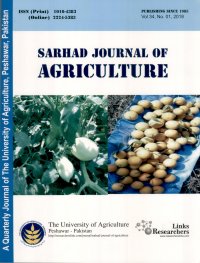Constraints and Gap Analysis of Model Farm Services Center Approach
Constraints and Gap Analysis of Model Farm Services Center Approach
Rehmat Ullah1*, Muhammad Zafarullah Khan1 and Kalim Ullah2
ABSTRACT
Constraints and gap analysis of Model Farm Services Center (MFSC) approach was investigated in District Dera Ismail Khan, Khyber Pakhtunkhwa, Pakistan, during year 2015. For the present study, a sample of 306 respondents was selected based on Sekaran sampling technique while using descriptive research design. Well-prepared and pre-tested interview schedule was utilized for collection of data. Descriptive statistics i.e. frequency, percentages and rank order was calculated. Chi-square test was performed to find out association among demographic characteristics and MFSC registration duration and Rank Based Quotient was calculated for problem identification. It was found that machinery was provided to almost half of the respondents. Similarly seed was the most provided input followed by fertilizers. Top most source of agriculture information was input dealers followed by Model Farm Services Center. The top learned skills by respondents in MFSC were the agronomic practices whereas there was big gap in horticultural practices. Major constraints identified were less machinery utilization duration, complication in machinery booking process, costly rental prices, out-dated machinery, preference of progressive farmers, no timely availability of Inputs, unviability of crop specific machinery. It was recommended that MFSC may take initiative to compel private companies to sponsor schemes for low cost inputs. MFSC may take initiative for funds on account of pragmatic trainings arrangement, subsidized inputs and crop specific machinery.
To share on other social networks, click on any share button. What are these?







